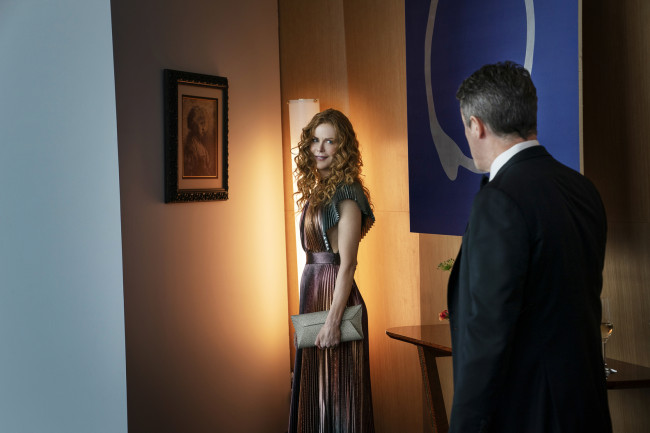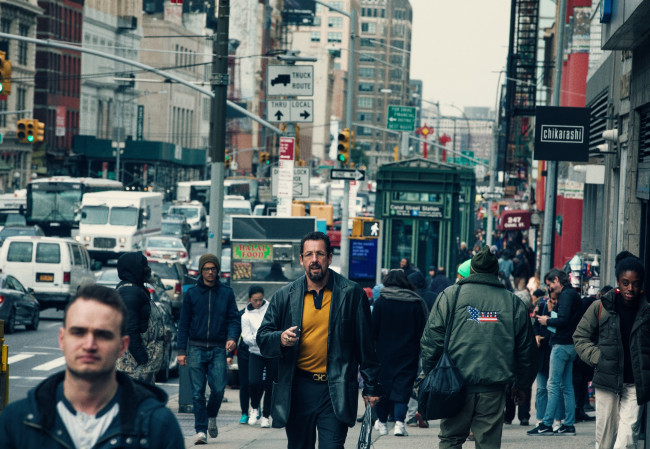Netflix's 'Pretend It's a City' with Fran Lebowitz is the trip back in time every New Yorker needs right now

“Pretend It’s a City” is a delightful and much-needed trip to pre-Covid, maskless NYC, with the famously opinionated and wonderfully irascible Fran Lebowitz.
The pandemic prompted many to leave New York City, which is one of the reasons why Martin Scorsese’s limited Netflix series “Pretend It’s a City,” featuring his friend, collaborator, and co-executive producer of the show, Fran Lebowitz, is the salve every New Yorker needs right now. Of course, the famously opinionated and wonderfully irascible Lebowitz, a lifelong New Yorker since arriving here when she was 18—she’s now 70—is not going anywhere. (She’s open to suggestions, but she’s not convinced anywhere else would take her.)
Beyond showcasing its subject’s singular wit, “Pretend It’s a City” is a delightful and much-needed trip to pre-Covid, maskless NYC, with Lebowitz strolling the city streets, holding court at the National Arts Club, looming over the Panorama of the City of New York at the Queens Museum, and pontificating in front of packed auditoriums. (More often than not, the sound of Scorsese’s infectious, uncontrollable laughter bubbles under her remarks.)
Lebowitz covers a lot of ground over the course of the seven, half-hour installments, but yes, she has plenty to say about living in New York City: What it was like when she got here in the 1970s, what it’s like now, and every New Yorker’s obsession, real estate. (The bulk of her thoughts on NYC real estate can be found in episode four, "Board of Estimate," which includes a novel analogy involving Brooks Brothers, Ralph Lauren, Gulf State architecture, and 57th Street.) Below, some of our favorite takes from the show.
'Times Square is the worst'
“Times Square is the worst neighborhood in the world. Sometimes I will figure out, if I have to go to a theater in Times Square, how can I get there walking through Times Square the least. I will do this even if it means walking all the way around. I think, ‘Let’s see. What if I walked up to 125th Street, then all the way down. Then I can pretty much miss this. That’s long, but it would be worth it.’”
“The streets are completely packed with these horrible planters. With fake plants or maybe real plants. I don’t know what they are...What are plants doing in Times Square? And not just Times Square. They’re all over the place. Plants, lawn chairs, you know, trinkets. Really, it looks like my grandmother’s apartment.”
'It's so hard to live in New York'
“No one can afford to live in New York. Yet, eight million people do. How do we do this? We don’t know. It’s a mystery to us. We don’t have a clue. We don’t know but we’re still here. So you can come here without knowing how you’re going to live here and somehow you will do enough things to live here. It’s as simple as that.”
“When you leave New York…you just can’t get over the ease of daily life. [Here] you move to an apartment you think, ‘Ugh, where is the dry cleaner? Am I ever gonna find a dry cleaner?’ Sometimes you never find one. Sometimes there isn’t one! Sometimes you go and I know it’s gonna be three months before I have such a fight, I won’t be able to go in there ever again. Then you think, 'There are people who live in places where they just...go to the dry cleaner. It’s like a little errand.' But everything in New York is like the Ring Cycle.’
“Everything in New York is an operatic thing. It’s incredible problems. So you realize that it’s just so hard to live in New York, that when people say, ‘Why do you live in New York?’ you really can’t answer them. Except you know that you have contempt for people who don’t have the guts to do it. [You think]: ‘You live in a place where things are just easily done! Where people are nice to you! Where no one’s trying to cheat you every five seconds! You call that grown-up life?’”
'New York used to be cheap'
“Everyone has this idea that New York used to be cheap. It was always more expensive than anyplace else. So if I tell someone, ‘This was my apartment on West 4th Street in 1970, it was $121.78 a month.’ People go, ‘Ah! That’s unbelievable!’ It was expensive. Most of my friends lived in the East Village. They would say, “You are crazy to spend all this money on one room. If you lived in my neighborhood on Avenue C, you could have four rooms for this.’ And I would say, ‘Yeah, but I don’t get raped.’ Which I always felt was worth the extra money.”
“Most of the people I knew who were financially like me, heat was a very big issue. We discussed it a lot. I would go to Max’s Kansas City and I would pick people up, but before, asking ‘Do you have heat?’ And that would be something I found incredibly alluring. All of the sudden the person turned into a young Brigitte Bardot. ‘You have heat? Let’s go.’”
“The New York Dolls, they were great and so few people saw them. They used to perform at the Mercer Arts Center, which one day, just fell down. That’s how New York used to be. That’s what New York used to be like…the building just fell down. That was the level of neglect. When people said, ‘Did you hear the Mercer Arts Center fell down?’, no one said, ‘What are you talking about?’ [They said], ‘Oh, it fell down.’”
The subway and the Dalai Lama
“I have all the habits that I had in the '70s. For instance, I sit on the subway, I see people put their bag next to them and leave it there. I think, ‘Are you out of your mind?’ It makes me want to steal it. No matter what I’m holding— it could be a pencil—I have a death grip on it: ‘You’re not getting this pencil from me.’”
“These [William Wegman mosaics at the 23rd Street station] are cute, ok? But really? This took five months?...The broken tiles are still there. The original schmutz, still there. The broken cement on the floor, still there. They didn’t touch it. So I think, ‘How could this take five months?’ And then I think about, you know, your contractor. Who renovated your apartment? They must have used him.”
“It would take the Dalai Lama one subway ride to turn into a lunatic raging person yelling, ‘Who cares about this art in the system?!’”
Her longtime apartment in The Osborne
“It was a nightmare living there. There would be one problem after another. The building was falling apart because it was so old. There was always construction. There was one huge problem after another. I never left there because I knew I would never have such a beautiful apartment again. And finally, one day, I actually said to myself, ‘Fran, you are like one of these women who’s married to a guy who beats her up. And her friends keep saying, 'You have to leave him. He beats you up.' And she says, 'But he’s so handsome.'... Finally I realized this was me with my apartment! I finally thought, ‘You know what? He beats you up. Leave.’”
Going into 'psychotic debt' like an American
"After a year of looking at apartments, during which the prices were going up by the hour...You would go Monday to look at an apartment. You would go to look at the same apartment Wednesday. It was $50,000 more. I would say, ‘I just looked at this apartment Monday. Why is it $50,000 more?’ [The broker would say], ‘The market’s going up. Better buy it now.’ ‘I don’t really like it.’ ‘Doesn’t mean you shouldn’t buy it now.’”
"If I was asking myself, “What can you pay for an apartment? I would have told you a third of what I paid for this apartment. People kept saying, ‘When are the prices gonna to go down?’ And I said, ‘Just wait. Wait until I close on this apartment.’ And then I closed on the apartment and prices started going down.”
“I've come to understand that my greed for apartments and furniture and things like that is so intense that even though I feel very, very worried having done this, I feel less worried than I do happy to be having this swell apartment. This has made me feel the most American that I’ve ever felt in my life. I feel I’ve joined my fellow Americans in being in psychotic debt for no reason at all…Why shouldn’t I have a 20 million-square-foot apartment? I’m tired of not having this! Because that’s really what it is.”
“When I was first [at the panorama]...I looked for my building where I live, which, at the time [the panorama] was built, the building I live in was three warehouses made into an apartment building. And I managed to locate them. And you feel what you always feel. ‘I should have bought it then.’”
You Might Also Like


























